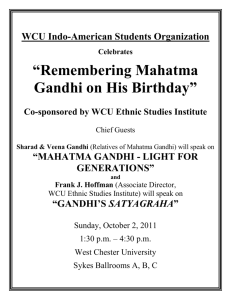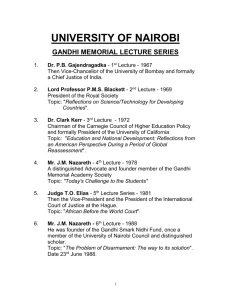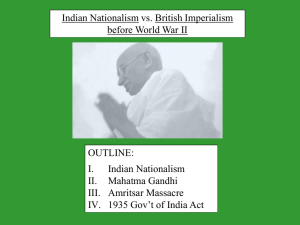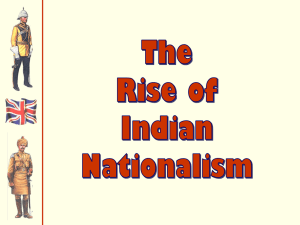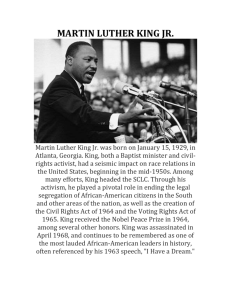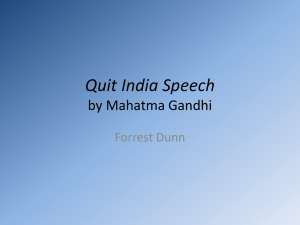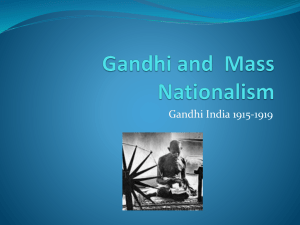Felicia`s essay 1
advertisement
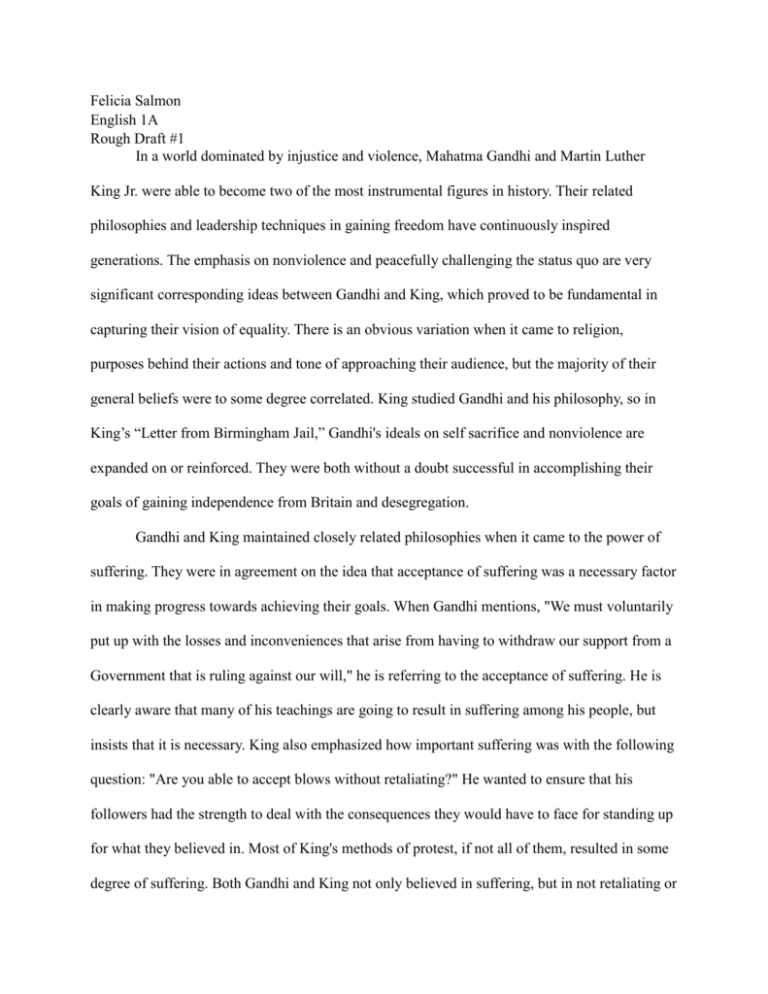
Felicia Salmon English 1A Rough Draft #1 In a world dominated by injustice and violence, Mahatma Gandhi and Martin Luther King Jr. were able to become two of the most instrumental figures in history. Their related philosophies and leadership techniques in gaining freedom have continuously inspired generations. The emphasis on nonviolence and peacefully challenging the status quo are very significant corresponding ideas between Gandhi and King, which proved to be fundamental in capturing their vision of equality. There is an obvious variation when it came to religion, purposes behind their actions and tone of approaching their audience, but the majority of their general beliefs were to some degree correlated. King studied Gandhi and his philosophy, so in King’s “Letter from Birmingham Jail,” Gandhi's ideals on self sacrifice and nonviolence are expanded on or reinforced. They were both without a doubt successful in accomplishing their goals of gaining independence from Britain and desegregation. Gandhi and King maintained closely related philosophies when it came to the power of suffering. They were in agreement on the idea that acceptance of suffering was a necessary factor in making progress towards achieving their goals. When Gandhi mentions, "We must voluntarily put up with the losses and inconveniences that arise from having to withdraw our support from a Government that is ruling against our will," he is referring to the acceptance of suffering. He is clearly aware that many of his teachings are going to result in suffering among his people, but insists that it is necessary. King also emphasized how important suffering was with the following question: "Are you able to accept blows without retaliating?" He wanted to ensure that his followers had the strength to deal with the consequences they would have to face for standing up for what they believed in. Most of King's methods of protest, if not all of them, resulted in some degree of suffering. Both Gandhi and King not only believed in suffering, but in not retaliating or causing someone else to suffer in return. The two were both able to validify their views on suffering through their personal actions. Both men not only spent time in jail, but were willing to give up everything they had in order to remain loyal to their foundation of nonviolently challenging the status quo. It is quite evident that Gandhi and King both had a low tolerance for cowardice. They expressed their corresponding view in different ways. King emphasized his low tolerance for cowardly acts when he referred to the Christian church. His disappointment is emphasized when he states, "I have heard numerous religious leaders of the south encourage worshipers to comply with a desegregation decision because it is a law, but I have longed to hear a white minister say "follow decree because integration is morally right and the negro is your brother." He was extremely disappointed in the church's lack of courage to support desegregation based on the fact that it was morally right. Even though Gandhi stood so strongly against violence, he expressed his disdain towards cowardice when he stated, "I do believe that where there is only a choice between cowardice and violence I would advise violence." He basically reveals that he would rather have someone turn to violence, the act that would negate his whole entire philosophy than be a coward. This statement alone sparks a divergence between the two. Under all circumstances, King disapproved of violence. Gandhi, on the other hand made exceptions to when violence was necessary and appropriate. Gandhi's notion of passive resistance seems to mirror King's notion of direct action. Both passive resistance and direct action sought to reform unjust societies by non violent means. Direct action consisted of boycotts, sit ins, marches and other non violent methods of protest and civil disobedience that King supported. Gandhi's passive resistance consisted of fasting, boycotting British goods, and simplifying life. Both of their techniques were effective in forcing an uncooperative government or community to confront issues. King and Gandhi also both emphasized that direct action and passive resistance were process-based. It is evident that in order to become a true Passive Resister, continuous training of the soul is necessary. There was also a process when it came to direct action. Not only were workshops held to educate King's followers, but there were steps which King listed that must be taken before direct action was taken. King's belief of following just laws and disobeying unjust laws based on morality, mimics Gandhi's belief of Satyagraha. Gandhi referred to Satyagraha as a force based on truth. He did not want people to practice Satyagraha just to imitate him or their peers. He strongly believed that one had to undergo a moral process to truly commit to Satyagraha and could not do so with mixed motives. King went on to explain that one should disobey unjust laws if they are morally wrong. He stated that "An unjust law is no law at all." He did not want people to approve or disapprove of decisions just because they were considered "laws." King's "Letter from Birmingham Jail" revolves around a more prescriptive basis than Gandhi's published works. He provides clear and step by step instructions to how he feels his fellow African American community can gain their equality. King provides the basic proponents he feels necessary for his people to abide by in the following statement: "In any nonviolent campaign there are four basic steps: (1) collection of the facts to determine whether injustices are alive, (2) negotiation, (3) self-purification, and (4) direct action." Throughout his letter, he continues to be straight forward and to the point. This shows that his main concern was gaining freedom from racial discrimination and made sure that his audience was fully aware of that. King goes on to respond to specific critiques and situations that the clergymen publicly commented on. Each of King's major topics that he specifically covers in his "Letter from Birmingham Jail" begins with a question or concern from the clergyman. One can see how he sticks to specifics and doe not tangent off into generalizations. Gandhi, on the other hand seemed to be a little more general. Through his works, he was elaborating and explaining his ways of thinking. He was basically proposing a way of living that he felt everyone should adopt. He was also responding to criticism, but he was mainly trying to promote satyagraha and was teaching a principal that could be applied to all aspects of living. King and Gandhi use different rhetorical strategies in trying to persuade their audiences which effects and determines their overall tone. It appears that King comes off as more aggressive than Gandhi. This may be the case based on the location and circumstances that the two were in. Many of Gandhi’s works were written to address current issues or clarify exactly what he was preaching which can explain why his works come off as more calm and gentle. King took a more critical and aggressive approach. He was writing from jail and addressing critics who did not feel his pain and never would have been able to experience such anguish that African American were experiencing at the time. King also used more of an emotional appeal which can be seen when king states, "when you suddenly find your tongue twisted and your speech stammering as you seek to explain to your six-year-old daughter why she cant go to the public amusement park, and seed tears welling up in her little eyes when she is told that Funtown is closed to colored children..." The following condensed statement undoubtingly brings about emotion and makes King’s letter more personal. A deviation is apparent when is comes to the motives behind King and Gandhi taking action. It is accurate to say that both leaders were fighting for freedom, but there is a differentiation when dealing with the causes of doing so. Gandhi was focused on India's liberation from Great Britain as well as teaching satyagraha. He felt that it was possible for his country to function on its own, without dependence on Britain. King on the other hand, was working towards the stoppage of racial discrimination and segregation among African Americans. There is also a difference between the two when it came to religion. When referring to Gandhi's quote "All religious sects, all churches and temples, are useful only so long as they serve as a means towards enabling us to recognize the universality of satyagraha," one can conclude that he did not necessarily believe in or associate him self with only one religion. His concern was that all religions focused on the practice of satyagraha. There are proponents from different religion that were blended together to form Gandhi's belief. King was openly a Christian and was not only a Baptist minister, but also a member of many Christian associations such as the Southern Christian Leadership Conference. He did associate himself with the Christian church, but this does not mean that King felt his religion was perfect. In fact, throughout his "Letter from Birmingham Jail," he even questions the Christian church and criticizes it. He felt that the church was not coming to the aid of justice and did not have the courage and strength to openly support desegregation because it was morally right. When King says "all too many others have been more cautious than courageous and have remained silent behind the anesthetizing security of the stained-glass windows," it shows that he did not have support from his fellow Christian community which lead to him questioning his own religion. After analyzing the works of Martin Luther King Jr and Mahatma Gandhi, it is safe to say that their similarities overshadowed their differences. They were able to accomplish the impossible through their practice of peaceful mass civil disobedience and their philosophies will continue to impact society for a lifetime.
